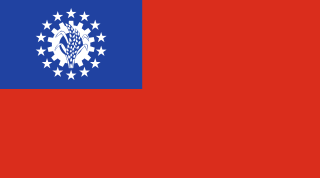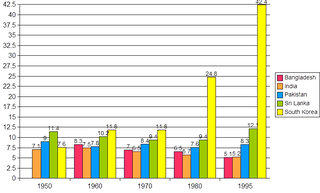Privatization can mean several different things, most commonly referring to moving something from the public sector into the private sector. It is also sometimes used as a synonym for deregulation when a heavily regulated private company or industry becomes less regulated. Government functions and services may also be privatised ; in this case, private entities are tasked with the implementation of government programs or performance of government services that had previously been the purview of state-run agencies. Some examples include revenue collection, law enforcement, water supply, and prison management.
A mixed economy is variously defined as an economic system blending elements of a market economy with elements of a planned economy, markets with state interventionism, or private enterprise with public enterprise. Common to all mixed economies is a combination of free-market principles and principles of socialism. While there is no single definition of a mixed economy, one definition is about a mixture of markets with state interventionism, referring specifically to a capitalist market economy with strong regulatory oversight and extensive interventions into markets. Another is that of active collaboration of capitalist and socialist visions. Yet another definition is apolitical in nature, strictly referring to an economy containing a mixture of private enterprise with public enterprise. Alternatively, a mixed economy can refer to a reformist transitionary phase to a socialist economy that allows a substantial role for private enterprise and contracting within a dominant economic framework of public ownership. This can extend to a Soviet-type planned economy that has been reformed to incorporate a greater role for markets in the allocation of factors of production.

Ne Win was a Burmese politician and military commander who served as Prime Minister of Burma from 1958 to 1960 and 1962 to 1974, and also President of Burma from 1962 to 1981. Ne Win was Burma's military dictator during the Socialist Burma period of 1962 to 1988.
A state-owned enterprise (SOE) or government-owned enterprise (GOE) is a business enterprise where the government or state has significant control through full, majority, or significant minority ownership. Defining characteristics of SOEs are their distinct legal form and operation in commercial affairs and activities. While they may also have public policy objectives, SOEs should be differentiated from government agencies or state entities established to pursue purely nonfinancial objectives.

The public sector is the part of the economy composed of both public services and public enterprises.

State ownership, also called government ownership and public ownership, is the ownership of an industry, asset, or enterprise by the state or a public body representing a community as opposed to an individual or private party. Public ownership specifically refers to industries selling goods and services to consumers and differs from public goods and government services financed out of a government's general budget. Public ownership can take place at the national, regional, local, or municipal levels of government; or can refer to non-governmental public ownership vested in autonomous public enterprises. Public ownership is one of the three major forms of property ownership, differentiated from private, collective/cooperative, and common ownership.
Nationalization is the process of transforming privately-owned assets into public assets by bringing them under the public ownership of a national government or state. Nationalization usually refers to private assets or to assets owned by lower levels of government being transferred to the state. Nationalization contrasts with privatization and with demutualization. When previously nationalized assets are privatized and subsequently returned to public ownership at a later stage, they are said to have undergone renationalization. Industries often subject to nationalization include the commanding heights of the economy - telecommunications, electric power, fossil fuels, railways, airlines, iron ore, media, postal services, banks, and water - though, in many jurisdictions, many such entities have no history of private ownership.
Chinese Burmese, also Sino-Burmese or Tayoke, are a group of overseas Chinese born or raised in Myanmar (Burma). Among the under-documented Chinese populations are those of mixed background but are not counted due to the lack of reliable census taking. As of 2012, the Burmese Chinese population is estimated to be 3% of the country's population.
The Burmese Way to Socialism, also known as the Burmese Road to Socialism, was the state ideology of the Socialist Republic of the Union of Burma, the socialist state governed by the Burma Socialist Programme Party (BSPP) from 1962 to 1988.

The Socialist Republic of the Union of Burma, known as the Union of Burma from 1962 to 1974, was a socialist state that existed in Burma from 1962 to 1988. It was founded by the Union of Burma Revolutionary Council (RC), the military junta established by Ne Win and his allies in the Tatmadaw after they overthrew the democratically elected government of Prime Minister U Nu in a coup d'état on 2 March 1962.

The Michigan Life Sciences Corridor (MLSC) is a $1 billion biotechnology initiative in the U.S. state of Michigan.
National champions are corporations which are technically private businesses but due to governmental policy are ceded a dominant position in a national economy. In this system, these large organizations are expected not only to seek profit but also to "advance the interests of the nation"; the government sets policies which favor these organizations. The policy is practiced by many governments, in some sectors more than others, but by giving an unfair advantage against market competition, the policy promotes economic nationalism domestically and global pre-eminence abroad contrary to the free market. The policy also deters or prevents venture capitalism.
The Road Transport Authority of Myanmar is part of that country's Ministry of Rail Transportation. It was founded in 1959 as the Naypyidaw Transport Company. In 1962, it became Burma Economic Development Corporation (BEDC). In 1963 it changed to Road Transport Group. In 1972 it changed its name to Road Transport Corporation, and in 1989 it became Road Transport Authority under the Ministry of Railroad Transport.
The social dividend is the return on the capital assets and natural resources owned by society in a socialist economy. The concept notably appears as a key characteristic of market socialism, where it takes the form of a dividend payment to each citizen derived from the property income generated by publicly owned enterprises, representing the individual's share of the capital and natural resources owned by society.

The Nationalisation process in Pakistan was a policy measure programme in the economic history of Pakistan, first introduced, promulgated and implemented by Prime Minister Zulfikar Ali Bhutto and the Pakistan Peoples Party to lay the foundation of socialist economics reforms to improve the growth of national economy of Pakistan. Since the 1950s, the country had undergone a speedy industrialisation and became an industrial paradise in Asia. But, as time progressed, the labour trade unions and labour-working class had increasingly strained relations with the industrial business oligarch class, having neglected to improve working conditions and failing to provide a healthy and safe environment for the workers in these industrial industries.
Myanma Economic Holdings Public Company Limited is one of two major conglomerates run by the Burmese military, the other being the Myanmar Economic Corporation (MEC). MEHL business interests include banking, construction, mining, agriculture, tobacco and food.

The Myanmar Securities Exchange Centre (MSEC), located in Yangon, Myanmar, is one of the two stock exchanges in the country. The exchange, a 50-50 joint venture between the state-owned Myanma Economic Bank and the Daiwa Securities Group, currently lists only two securities, both of which are rarely traded. The over-the-counter (OTC) market remains open despite the Yangon Stock Exchange's arrival in 2015.
A government-owned enterprise, a government-owned corporation, a statutory corporation or a nationalized company in India is called a Public Sector Undertaking (PSU) or a Public Sector Enterprise (PSE). These establishments are wholly or partly owned by the government of India and/or one of the many state or territorial governments. The employees of these PSEs—Gazetted officers and their subordinates—are fully-fledged government employees. Central Public Sector Undertakings are wholly or partly owned by the government of India, while State Level Public Sector Undertakings are wholly or partly owned by state or territorial governments.
The Myanma Agricultural Development Bank is a government-owned bank specialized in providing financial services to agricultural enterprises in Myanmar (Burma), and is the largest financial institution of its kind. The bank is owned operated by the Ministry of Agriculture and Irrigation (MAI), and has 206 branches nationwide. MADB provides loans to a sizable number of rural households, serving 1.87 million customers in 2012. MADB loan products typically cover farmers' short-term working capital needs.






